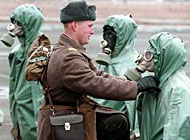Geneva bids to become home of new biological weapons agency

Switzerland is bidding to become the home of a new United Nations agency for tackling the threat of biological weapons. The Swiss are hoping Geneva will be chosen, despite competition from The Hague.
The new Biological Weapons Secretariat will be responsible for implementing the 1972 Convention on Biological Weapons, which prohibits the production and stockpiling of these arms.
“We are confident because Geneva is the logical location,” says Christian Faessler, the Swiss ambassador to the United Nations Disarmament Conference, who is handling Geneva’s candidature.
Faessler’s delegation has offered a number of tempting sweeteners to persuade a special ad hoc committee which must decide where the agency should be based.
If Geneva is chosen, the new secretariat will be given rent-free accommodation for five years and subsidised rents thereafter, as well as free provision of office equipment and furniture and free parking.
If the new agency opts to build its own premises, it will be offered a plot of land free of charge and an interest-free loan for construction.
The package on offer suggests Switzerland has learnt lessons from past experience. In the early 1990s the Swiss failed to persuade the UN to make Geneva the base for the then new Chemicals Weapons Organisation.
The Swiss freely admit that the failure was in part due to their arrogant assumption that Geneva would be chosen. Instead it went to The Hague.
Now the Dutch city is vying to become home to the new biological weapons agency. But Faessler believes its earlier success will not influence the decision.
“They have a case, but not a very strong one,” he told swissinfo. “The Chemicals Weapons organisation is a completely different animal. It works on an entirely different basis.
“Geneva has the necessary framework and experience for welcoming new organisations,” he added. “The Hague simply cannot compare.”
The Swiss stressed that Geneva has always been the natural home for the fight against biological weapons. The first protocol on the subject was signed in the city in 1925, the negotiations on the 1972 Biological Weapons Convention were conducted there, as are the talks on setting up the new agency.
One of Geneva’s biggest advantages is that it is home to a number of other organisations which can help the Biological Weapons Secretariat in its work. These include the International Committee of the Red Cross, the World Health Organisation and several non-governmental organisations.
“Geneva has a research environment and an industrial environment with is favourable for this kind of work,” Faessler said.
“The aim of this secretariat is not only to implement the convention, it also has a very strong cooperative element. That is, cooperation between North and South, and there again there is a long-standing tradition in Geneva,” he added.
Faessler admits that negotiations on the functions of the secretariat and its eventual location are difficult. But he says he is hopeful that the issue will be decided by the end of next year.
The 1972 Biological Weapons Convention has been signed by 138 countries. But it is seen as being virtually toothless because it does not provide for independent inspections to ensure that countries are not developing or stockpiling these weapons.
“After the end of the Cold War, it was realised that it was possible to go further that simply banning these weapons, that is, it was possible to create a protocol whereby the convention could be applied more rigorously,” Faessler says.
Biological weapons are particularly worrying because they are relatively cheap and simple to produce and can be easily stored in facilities that have other, legitimate purposes.
by Roy Probert

In compliance with the JTI standards
More: SWI swissinfo.ch certified by the Journalism Trust Initiative
You can find an overview of ongoing debates with our journalists here . Please join us!
If you want to start a conversation about a topic raised in this article or want to report factual errors, email us at english@swissinfo.ch.